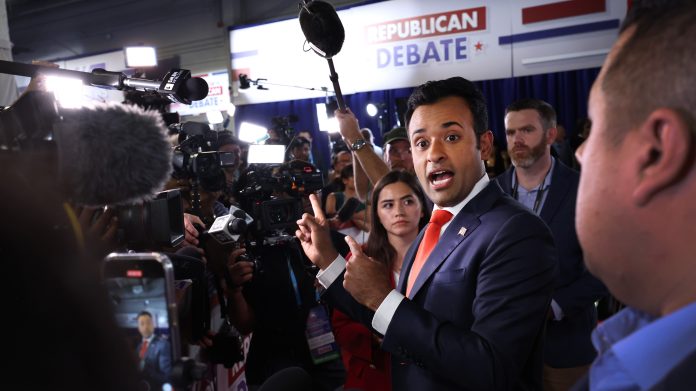Subscribe here: Apple Podcasts | Spotify | YouTube | Google Podcasts | Pocket Casts
One couldn’t help but pity the dutiful campaign staffers and surrogates who trickled into the spin room in Milwaukee last night. They arrived with an unenviable task: to convince reporters that their respective candidates had won the first debate of the Republican presidential primary.
To anyone who had watched, it was plain, of course, that none of the eight Republicans onstage had won in any meaningful sense. Donald Trump—facing four indictments and leading in the polls by 40 points—didn’t even bother to show up. And with many voters tuning in to the race for the first time, Trump’s rivals struggled to show they were equipped to take him down. In fact, few even tried. The former president’s name barely came up in the debate’s first hour—and when the conversation did turn to the subject of his growing rap sheet, most of the candidates defended him. All but two pledged to support Trump as the party’s nominee even if he is convicted. By the end of the evening, Trump’s path to renomination looked clearer than ever.
So how to spin this state of affairs if you work for one of the also-rans?
The answer, it turned out, was simple: Ignore it.
In multiple interviews after last night’s debate, I asked GOP campaign representatives how they planned to win the primary if their candidates were unwilling to directly confront Trump. Some offered platitudes—“This is a marathon, not a sprint.” Others gestured vaguely at plans to criticize the front-runner in the future. Most flatly refused to acknowledge the reality of Trump’s current dominance in the race. They preferred to pretend.
Representative Chip Roy of Texas, a supporter of Florida Governor Ron DeSantis, scoffed when I mentioned Trump’s lead in the polls. “Go back and look at where Ted [Cruz] was in the numbers in 2016,” Roy instructed me.
“But … Cruz didn’t win the primary,” I replied, confused.
“Well, but he won Iowa!”
Matt Gorman, a spokesperson for Senator Tim Scott’s campaign, complained that reporters and pundits were overstating the likelihood of another Trump nomination. “Too many people think it’s inevitable,” he said. But when asked how that outcome might be avoided, Gorman had only wishful thinking to offer: “We hope that [Trump] debates. That’s our hope.”
[Read: A parade of listless vessels]
It’s easy to see why, in an ideal world, Trump’s rivals would want to get him back on the debate stage. Several of the candidates managed strong moments last night. Former South Carolina Governor Nikki Haley earned loud applause after calling out Republicans in Washington for adding trillions of dollars to the national debt: “Our kids are never going to forgive us for this.” Former New Jersey Governor Chris Christie offered a passionate defense of former Vice President Mike Pence for refusing to go along with Trump’s ploy to overturn the 2020 election on January 6, 2021: “He deserves not grudging credit. He deserves our thanks as Americans for putting his oath of office and the Constitution of the United States before personal, political, and unfair pressure.” And the 38-year-old entrepreneur Vivek Ramaswamy successfully made himself the evening’s main character with a rat-a-tat of Trumpian talking points, one-liners, and comic insults that aggravated his opponents as the debate wore on.
Some of the debate’s sharpest moments came when the candidates were tangling with Ramaswamy. Christie derided him as an “amateur” who “sounds like ChatGPT.” Haley, a former ambassador to the United Nations, snapped at him, “You have no foreign-policy experience, and it shows.” Even Pence, who typically affects the manner of a sleepy Sunday-school teacher, seemed to repeatedly lose his cool with Ramaswamy. “Now is not the time for on-the-job training,” Pence said at one point. “We don’t need to bring in a rookie.” (This counts as a harsh burn for Pence.)
On social media and in the press room, theories abounded as to why Ramaswamy seemed to be getting under so many of his opponents’ skin. Maybe it was generational—the know-it-all Millennial with the irritating high-school-debate patter disrespecting his Boomer elders. Or maybe it was his “Ted Cruz energy”—that signature blend of arrogance and smarminess that seems calibrated to repel. Certainly it didn’t help that Ramaswamy insisted on dismissing his opponents as “super-PAC puppets.”
[Read: Vivek Ramaswamy’s truth]
But perhaps the onstage hostility had less to do with Ramaswamy than with that other blustery political neophyte who cartwheeled into GOP politics one day on a whim and promptly overshadowed the rest of the field. With Trump refusing to participate in the debates, Ramaswamy made for a serviceable proxy. (Certainly, his campaign seems to share Trump’s taste for trolling: When I asked Chris Grant, a Ramaswamy adviser, about Pence’s repeated outbursts at the candidate last night, Grant laughed and then giddily compared the former vice president to the grandpa on The Simpsons yelling at a cloud.) Still, sinking Ramaswamy—who currently polls in the high single digits—won’t meaningfully change the shape of the field. The only way to pull that off is to take votes away from the front-runner. And no one seems to have a clear plan to do that.
Back in January, I wrote about the “magical thinking” that pervaded the GOP ahead of 2024. Virtually everyone in the party I talked with—donors, strategists, elected officials—wanted to move on from Trump, but no one was willing to do anything about it. Instead, they all seemed to be waiting for the problem to resolve itself, whether via criminal charges or death or some other miraculous development. “There is a desire for deus ex machina,” one GOP consultant told me at the time. “It’s like 2016 all over again, only more fatalistic.”
Seven months later, on a debate stage in Milwaukee, we witnessed the natural consequence of this attitude. Trump—still alive—is gliding toward his third consecutive presidential nomination while his rivals squabble with one another.

















